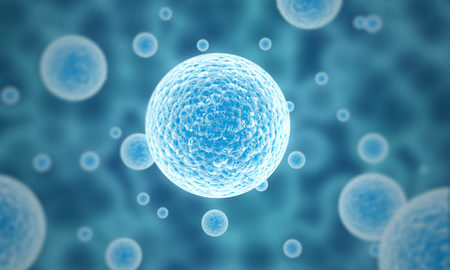Stem Cells May Be the Link between Cancer and Bacteria

Approximately 28,000 Americans receive a new diagnosis of gastric cancer each year. At any given time, close to 100,000 Americans are living with gastric cancer. The disease claims more than 10,000 lives annually. Stomach cancer is most commonly diagnosed in men and women between the ages of 65 and 74. In addition to age, diet and infection with bacteria called Helicobacter pylori are known risk factors.
Gastric Cancer and H. pylori
Stomach cancer is associated with a high death rate because it is usually diagnosed at an advanced stage. One of the primary causes of the disease is Helicobacter pylori, a bacterium that is present in the gastrointestinal tract of 50 percent of humans. Viruses are known to induce tumors by introducing transforming oncogenes into host cells. The tumor-inducing mechanism of bacteria is less well understood.
Stem Cells May Be the Link Between Cancer and Bacteria
Researchers at Stanford University in California and the Max Planck Institute in Berlin collaborated to investigate the link between cancer and bacteria. They discovered that H. pylori promotes stem cell turnover and sends it into overdrive. The renewal of stem cells has long been suspected to play an important role in the development of gastric cancer.
The team found that there are two types of stem cells in the stomach, each of which has a different response to the same signal. The scientists discovered a new mechanism by which bacterial infection with H. pylori puts tissue renewal into overdrive. The team, led by Thomas F. Meyer in Berlin, found that H. pylori causes changes in the epithelial lining of the stomach. What was puzzling about gastric cancer was that malignancy could occur in a tissue that is so rapidly replaced in healthy individuals.
Stomach Cancer and Bacteria
Cells in the inner lining of the stomach are replaced from the bottom up, i.e., stem cells at the bottom replace the remaining cells in the gland. The belief has been that H. pylori affects only the surface cells. This dogma was overturned by Michael Sigal, a German scientist who worked with the team at Max Planck Institute. Whereas the surface cells are routinely sloughed off, the deeper stem cells have a long life. The researchers found that contrary to what was believed earlier, the bacteria penetrate to the deeper layers and induce division of cells in this layer. This response to infection is associated with the characteristic thickened mucosa in patients with gastric cancer.
Experiments in Mice Shed Light on Stomach Cancer
The results of the experiments conducted in mice were published in the journal Nature. The researchers found that in addition to Wnt, a signaling molecule which drives stem cell turnover, another molecule called R-spondin is present in the connective tissue underlying gastric glands. This molecule affects the two types of stem cells present in the stomach very differently. In response to H. pylori infection, R-spondin ramps up the division of stem cells with rapid turnover and silences the division of stem cells with slow turnover. This explains how bacterial infection increases stem cell turnover. Lifelong infection with the bacteria can result in chronic stem cell division and an increased risk of gastric cancer.
References:
- https://www.medicalnewstoday.com/releases/319078.php
- https://seer.cancer.gov/statfacts/html/stomach.html


